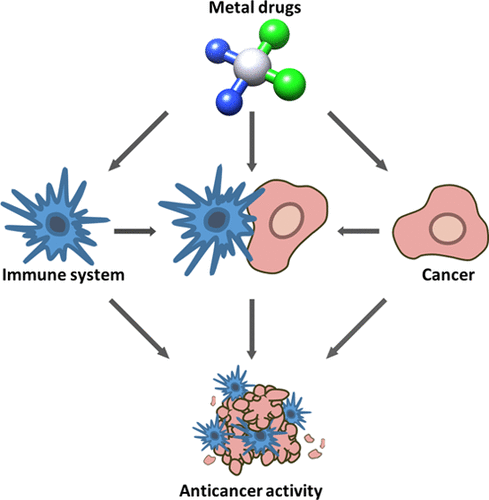当前位置:
X-MOL 学术
›
Chem. Rev.
›
论文详情
Our official English website, www.x-mol.net, welcomes your
feedback! (Note: you will need to create a separate account there.)
Metal Drugs and the Anticancer Immune Response
Chemical Reviews ( IF 51.4 ) Pub Date : 2018-11-29 00:00:00 , DOI: 10.1021/acs.chemrev.8b00396 Bernhard Englinger 1 , Christine Pirker 1 , Petra Heffeter 1, 2 , Alessio Terenzi 2, 3 , Christian R. Kowol 2, 3 , Bernhard K. Keppler 2, 3 , Walter Berger 1, 2
Chemical Reviews ( IF 51.4 ) Pub Date : 2018-11-29 00:00:00 , DOI: 10.1021/acs.chemrev.8b00396 Bernhard Englinger 1 , Christine Pirker 1 , Petra Heffeter 1, 2 , Alessio Terenzi 2, 3 , Christian R. Kowol 2, 3 , Bernhard K. Keppler 2, 3 , Walter Berger 1, 2
Affiliation

|
The immune system deploys a multitude of innate and adaptive mechanisms not only to ward off pathogens but also to prevent malignant transformation (“immune surveillance”). Hence, a clinically apparent tumor already reflects selection for those malignant cell clones capable of evading immune recognition (“immune evasion”). Metal drugs, besides their well-investigated cytotoxic anticancer effects, massively interact with the cancer-immune interface and can reverse important aspects of immune evasion. This topic has recently gained intense attention based on combination approaches with anticancer immunotherapy (e.g., immune checkpoint inhibitors), a strategy recently delivering first exciting results in clinical settings. This review summarizes the promising but still extremely fragmentary knowledge on the interplay of metal drugs with the fidelity of anticancer immune responses but also their role in adverse effects. It highlights that, at least in some cases, metal drugs can induce long-lasting anticancer immune responses. Important steps in this process comprise altered visibility and susceptibility of cancer cells toward innate and adaptive immunity, as well as direct impacts on immune cell populations and the tumor microenvironment. On the basis of the gathered information, we suggest initiating joint multidisciplinary programs to implement comprehensive immune analyses into strategies to develop novel and smart anticancer metal compounds.
中文翻译:

金属药物与抗癌免疫反应
免疫系统采用多种先天性和适应性机制,不仅可以抵御病原体,还可以防止恶性转化(“免疫监视”)。因此,临床上明显的肿瘤已经反映出对那些能够逃避免疫识别(“逃避免疫”)的恶性细胞克隆的选择。金属药物除了具有充分研究的细胞毒性抗癌作用外,还可以与癌症-免疫界面大量相互作用,并且可以逆转免疫逃逸的重要方面。最近,基于抗癌免疫疗法(例如免疫检查点抑制剂)的联合治疗方法,该话题引起了广泛关注,该策略最近在临床环境中产生了令人兴奋的结果。这篇综述总结了关于金属药物与抗癌免疫反应的真实性以及它们在不良反应中的作用之间相互作用的有希望的但仍然极为零碎的知识。它着重指出,至少在某些情况下,金属药物可诱导持久的抗癌免疫反应。该过程中的重要步骤包括改变癌细胞对先天性和适应性免疫的可见性和敏感性,以及对免疫细胞群和肿瘤微环境的直接影响。根据收集到的信息,我们建议启动联合多学科计划以实施全面的免疫分析,以开发新的和智能的抗癌金属化合物的策略。金属药物可以诱导持久的抗癌免疫反应。该过程中的重要步骤包括改变癌细胞对先天性和适应性免疫的可见性和敏感性,以及对免疫细胞群和肿瘤微环境的直接影响。根据收集到的信息,我们建议启动联合多学科计划以实施全面的免疫分析,以开发新的和智能的抗癌金属化合物的策略。金属药物可以诱导持久的抗癌免疫反应。该过程中的重要步骤包括改变癌细胞对先天性和适应性免疫的可见性和敏感性,以及对免疫细胞群和肿瘤微环境的直接影响。根据收集到的信息,我们建议启动联合多学科计划以实施全面的免疫分析,以开发新的和智能的抗癌金属化合物的策略。
更新日期:2018-11-29
中文翻译:

金属药物与抗癌免疫反应
免疫系统采用多种先天性和适应性机制,不仅可以抵御病原体,还可以防止恶性转化(“免疫监视”)。因此,临床上明显的肿瘤已经反映出对那些能够逃避免疫识别(“逃避免疫”)的恶性细胞克隆的选择。金属药物除了具有充分研究的细胞毒性抗癌作用外,还可以与癌症-免疫界面大量相互作用,并且可以逆转免疫逃逸的重要方面。最近,基于抗癌免疫疗法(例如免疫检查点抑制剂)的联合治疗方法,该话题引起了广泛关注,该策略最近在临床环境中产生了令人兴奋的结果。这篇综述总结了关于金属药物与抗癌免疫反应的真实性以及它们在不良反应中的作用之间相互作用的有希望的但仍然极为零碎的知识。它着重指出,至少在某些情况下,金属药物可诱导持久的抗癌免疫反应。该过程中的重要步骤包括改变癌细胞对先天性和适应性免疫的可见性和敏感性,以及对免疫细胞群和肿瘤微环境的直接影响。根据收集到的信息,我们建议启动联合多学科计划以实施全面的免疫分析,以开发新的和智能的抗癌金属化合物的策略。金属药物可以诱导持久的抗癌免疫反应。该过程中的重要步骤包括改变癌细胞对先天性和适应性免疫的可见性和敏感性,以及对免疫细胞群和肿瘤微环境的直接影响。根据收集到的信息,我们建议启动联合多学科计划以实施全面的免疫分析,以开发新的和智能的抗癌金属化合物的策略。金属药物可以诱导持久的抗癌免疫反应。该过程中的重要步骤包括改变癌细胞对先天性和适应性免疫的可见性和敏感性,以及对免疫细胞群和肿瘤微环境的直接影响。根据收集到的信息,我们建议启动联合多学科计划以实施全面的免疫分析,以开发新的和智能的抗癌金属化合物的策略。











































 京公网安备 11010802027423号
京公网安备 11010802027423号